
Whole School Curriculum Model
The intent of the Judgemeadow curriculum across all year groups is to create a school experience that offers academic excellence and holistic development, with a commitment to social mobility and equity for all.The Intent of the Curriculum
The intent of the Judgemeadow curriculum across all year groups is to create a school experience that offers academic excellence and holistic development, with a commitment to social mobility and equity for all. The subject specific nature of the curriculum is designed to be a mixture of what subject areas value in terms of knowledge and experience and what they assess; building toward final external assessment and the best possible outcomes.
Judgemeadow is building toward a coherent and seamless five year curriculum, creating an environment that is enabling subject leaders and subject teachers to explore what they believe are the experiences and values that are crucial in their subject areas; to lead not only to positive outcomes but positive experiences which enrich cultural capital and engender interest. We believe in a knowledge engaged and enabling curriculum, teaching knowledge in order to allow students to apply skills and to demonstrate changes to long term memory and learning over time. The development of the knowledge based aspects of the curriculum going forward are based very clearly around the research of ‘The Learning Scientists’ and the advocacy of the ‘effective learning strategies,’ with Rosenshine’s ‘Principles of Instruction’ underpinning our pedagogy
Options and Curriculum Diet
In Yr7 and Yr8 students follow a broad and balanced diet of subjects. They study the core subjects of English, Mathematics and Science, the humanities, RE and a language. They will also study the creative subjects of Art, Drama and Music, along with the technology based subjects of Design Technology, Food Technology and Information Technology. All students will also have two hours of Physical Education a week. Students will also experience our bespoke Personal Development Curriculum (PDC). During PDC lessons students develop their confidence regarding staying safe in different situations, their understanding of fundamental values and their understanding of other cultures and beliefs.
Throughout Year 7 and 8 all pupils are expected to complete a soft skills passport, which is called ‘Polished Judgemeadow.’ Being ‘Polished’ is about being able to successfully present yourself to others. This combines: confidence, the ability to speak formally, finding your own voice and knowing how to behave appropriately in different situations.
| year 7 and 8 | |
|---|---|
| Core Subjects |
English (4 lessons) Maths (4 lessons) RE (1 lesson) PE (2 lessons) Science (3 lessons) |
| Humanities/MFL |
History (2 lessons) Geography (2 lessons) French/Spanish (2 lessons) |
| Creative & Technology |
ICT (1 lesson) DT (1 lesson) Food Tech (1 lesson) Drama (1 lesson) Art (1 lesson) Music (1 lesson) |
During Yr8 students will start to develop some ownership about their curriculum and the qualifications they will take. They will make one choice from a range of subjects that they will study throughout Yr9 and Yr10 and then complete at the end of Yr10. They will also make two choices from the creative and technology subjects that they will be able to specialise in during Yr9. This Creative/Tech block has been specifically designed to maintain breadth of study and opportunity to maintain contact with these subject areas throughout the whole of Yr9, before deciding on a final second GCSE option for Years 10 and 11. Toward the end of Yr9 students will make their final option choice, to be studied during Yr10 and Yr11. They will also complete the study of their core subjects during Yr10 and Yr11.
Pupils going into Year 9 will follow a curriculum with EBacc at its heart. Approximately 85% of pupils will be entered for the Ebacc subjects with a small proportion of pupils following a slightly different pathway. The curriculum is personalised for some students with particular needs, for example a small number of our students are in receipt of an excellent alternative provision through our ‘Environmental Studies Project.’
Curriculum Diet for MAPs and HAPs
| year 9 | year 10 | year 11 | |
|---|---|---|---|
| Core Subjects | English (4 lessons)Maths (4 lessons)RE (2 lessons)PE (1 lessons)Science (5 lessons) | English (4 lessons)Maths (4 lessons)RE (2 lessons)All pupils complete RE GCSE at the end of Year 10PE (1 lessons)Science (5 lessons) | English (5 lessons)Maths (5 lessons)PE (1 lessons)Science (5 lessons) |
|
Humanities MFL |
History or Geography(2 lessons)MFL (2 lessons) | ||
| Options | Open choice 1 (3 lessons) Creative/Tech Choice x 2 Choice of two subjects from a block but not the open choice already chosen; the Creative/Tech block maintains breadth throughout Yr9(2 lessons) | A – Open choice 1(3 lessons)completed at the end of Yr10B – History/Geography(2 lessons)C – MFL (2 lessons)D – Open Choice 2 starts(2 lessons) | B – History/Geography(3 lessons)C – MFL (3 lessons)D- Open Choice 2(3 lessons) |
Curriculum Diet for LAPS (2018-2019 and beyond)
| year 9 | year 10 | year 11 | |
|---|---|---|---|
| Core Subjects | English (5 lessons)Maths (5 lessons)RE (2 lessons)PE (1 lessons)Science (5 lessons) | English (5 lessons)Maths (5 lessons)RE (2 lessons)PE (1 lessons)Science (5 lessons) | English (5 lessons)Maths (5 lessons)PE (1 lessons)Science (5 lessons) |
|
Humanities MFL |
History or Geography or MFL (2 lessons) | ||
| Options | Open choice 1(3 lessons) Creative/Tech Choice x 2 choice of two subjects from a block but not the open choice already chosen; the Creative/Tech block maintains breadth throughout Yr9 (2 lessons) | A – Open choice 1(3 lessons)completed at the end of Yr10 B-History/Geography/MFL(2 lessons)D – Open Choice 2 starts(2 lessons) | B-History/Geography/MFL(3 lessons)D – Open Choice 2(3 lessons)Intervention x 3 |
The curriculum diet moving forward is designed to open doors for students and increase aspiration. The core subjects of English, Maths and Science are the fundamental bedrocks of learning, with significant cross-curricular and life opportunity importance and this is broadly reflected in curriculum time, a particularly important focus in Year 11 as they will increase life chances and social mobility. The rationale for completing up to 2 GCSEs/Level 2 qualifications early will afford time to focus on the Ebacc in Y11 and also:
- Provide vital skills to students
- Provide a chance for early success and so increase confidence
- Offer pathways linked to ability thus allowing the best chance of success
- Stagger the increasing stresses and pressures of the new 1-9 exam courses, reducing anxiety and supporting mental health
The Implementation of the Curriculum
In order to promote an environment where the successful implementation of the curriculum leads to an exceptional quality of education for all learners, at Judgemeadow we offer teaching staff a range of suggested models and activities for lessons within well structured, planned and thought out scheme of work and curriculum designs. These models are very much based on the effective learning strategies and Rosenshine’s Principles of Instruction.
Connecting our Ideas Together
Before planning individual lessons, we need to think about the structure and the sahpe of our schme of work, within the big picture of our curriculum. What is the scheme of work aiming to achieve? What are the starting points and where do we want to get to? Then, we can begin thinking about the individual lessons along that journey from beginning to end. Within the lessons of that journey we should be looking to use Rosenshine's Principles as a way of underpinning lessons and the Effective Learning Strategies as the granular activities within lessons.
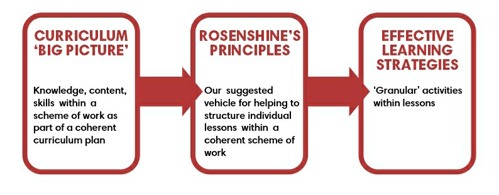
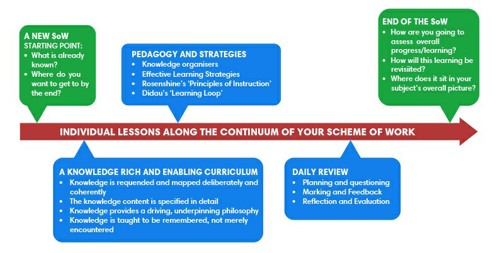
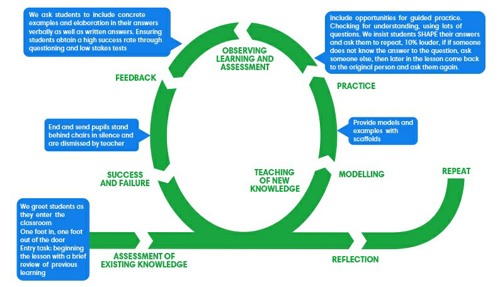
We also promote and implement a very definite whole school culture and ethos for Behaviour for Learning to enable all staff to work in an environment that allows them to confidently teach and implement the very best learning and pedagogical strategies.
Judgemeadow Ethos and Culture
At Judgemeadow we believe in:
- Being kind and helping others
- Respecting each other
- Being organised and disciplined
- Working hard
- Being proud of who we are
These beliefs underpin everything we do at school and we talk about them to pupils all the time. We believe that if students attend school, work hard and behave they WILL be successful. Through a knowledge rich and enabling curriculum, a common language for learning, the use of the Effective Learning Strategies and the fundamental aspects of Rosenshine’s Principles of Instruction, all students will make progress.
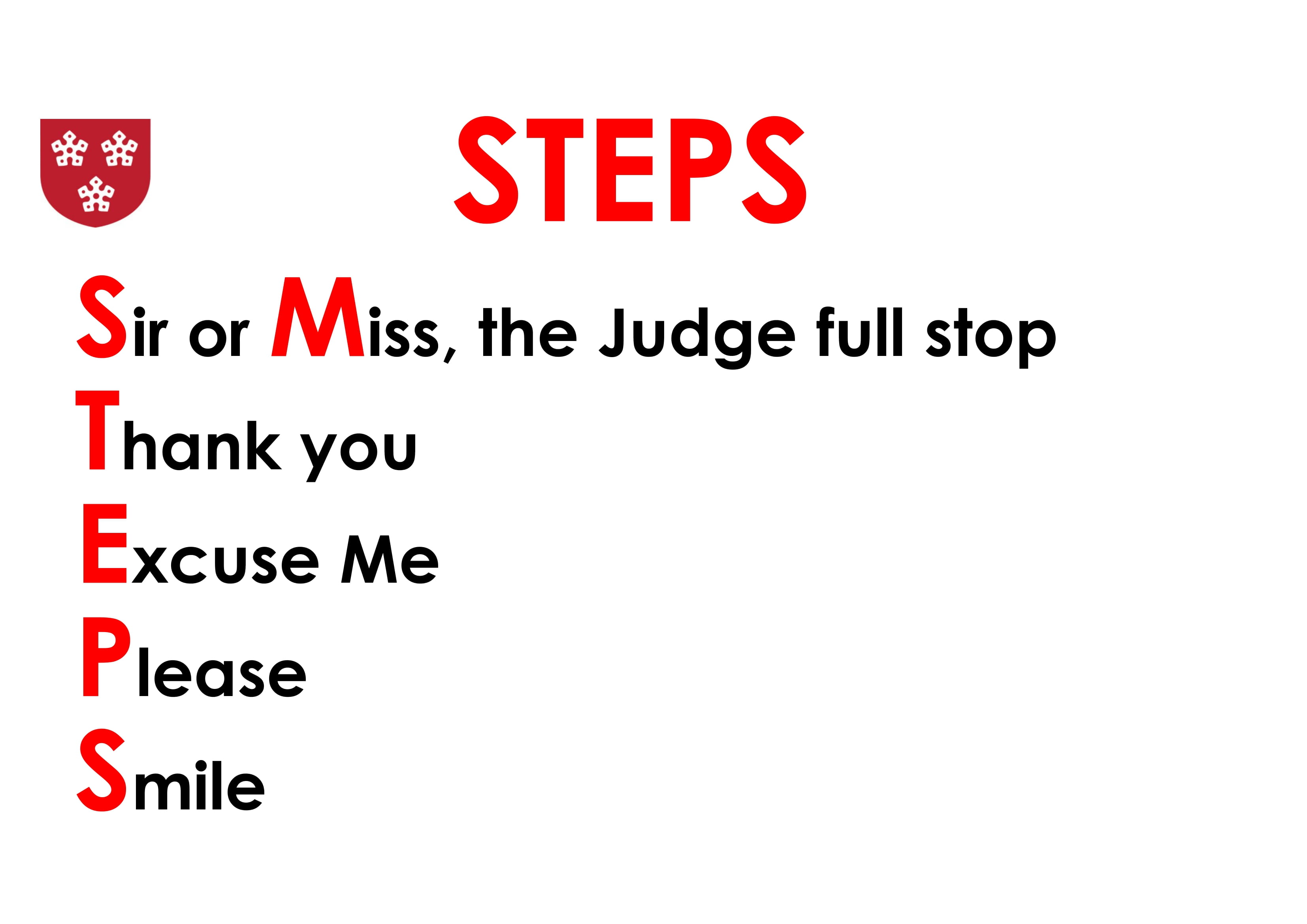
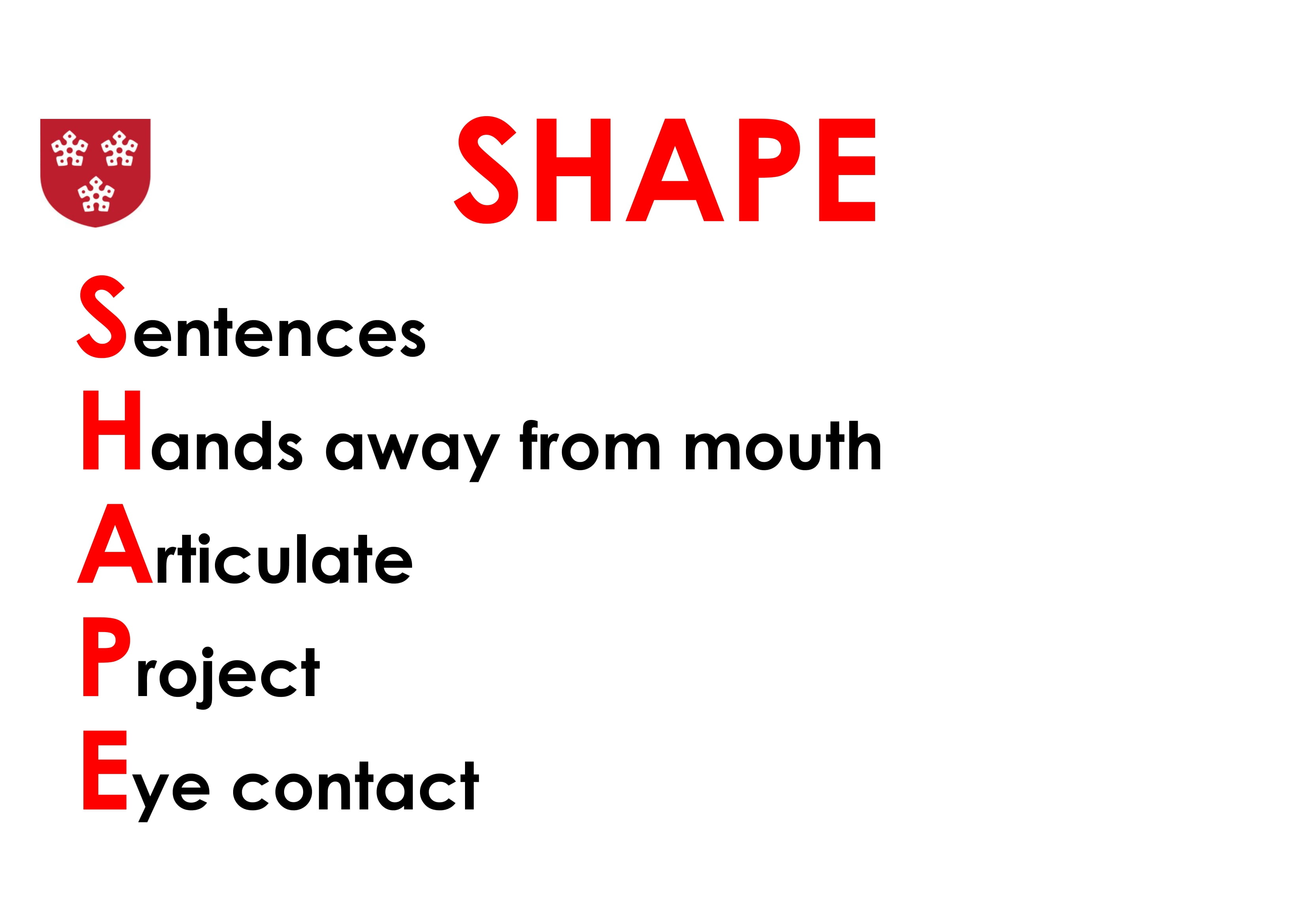
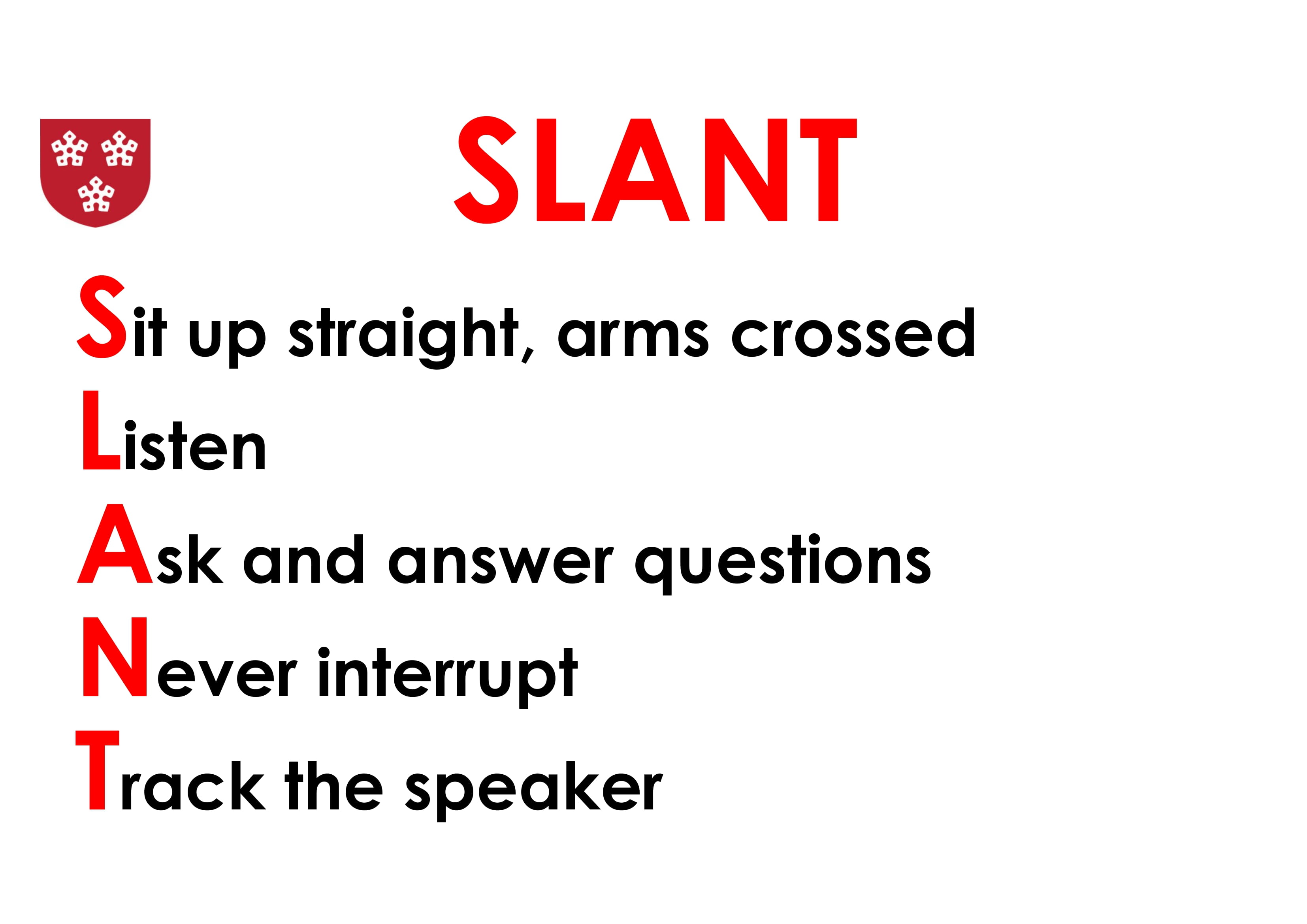
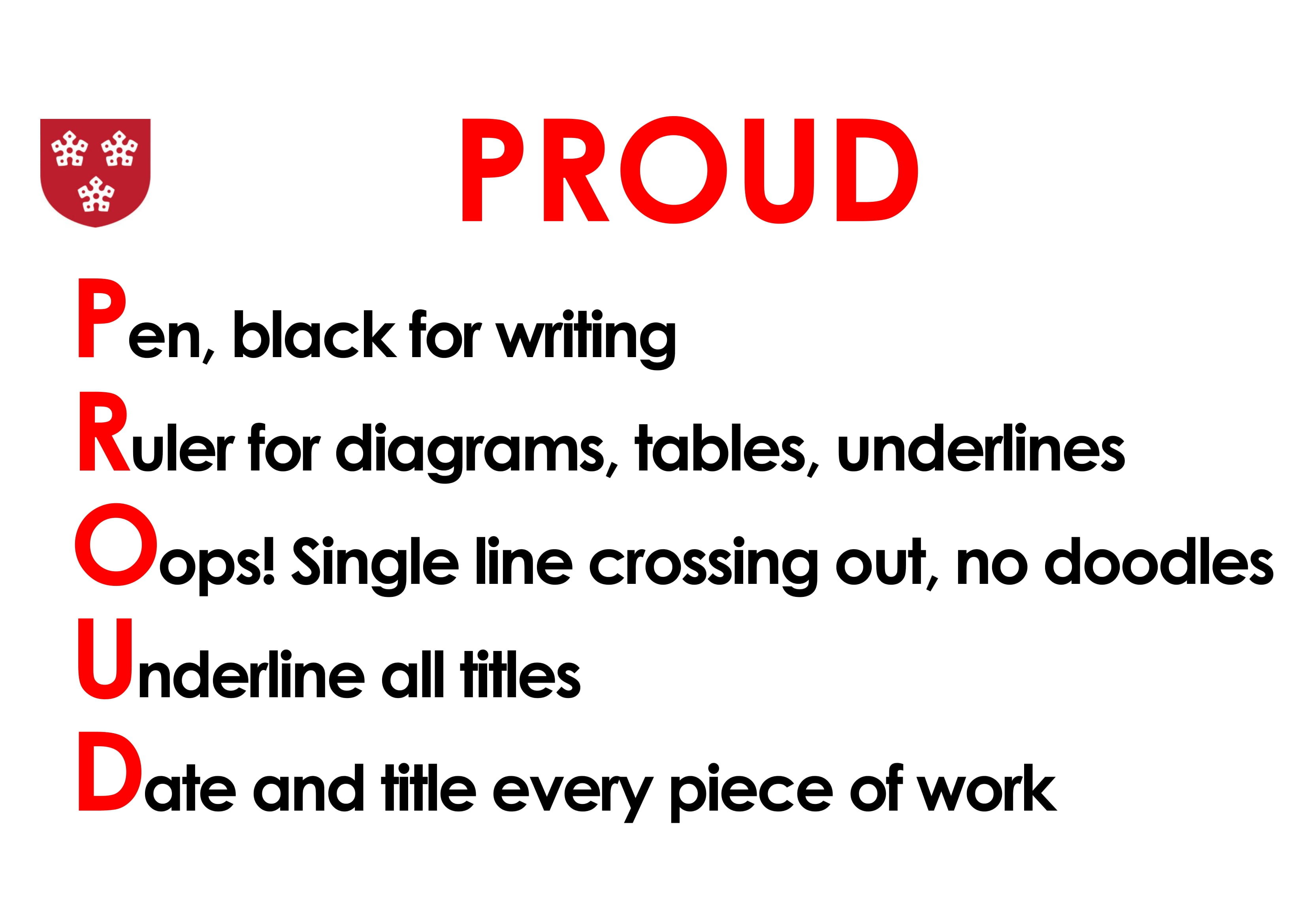
Common Language Used at Judgemeadow
- We greet students “Good morning Sir/Miss”
- We ask students how are they
- We model the behaviour we expect from students
- We ask students “To use their university voice and speak 10% louder”
- We explicitly make clear to students “To be a learner you must ….”
- We insist students use STEPS and say thank you
- We ask students to improve their oral answers – “Say it again, better”
- We are explicit and explain why, when we award C1
The Impact of the Curriculum
- Continually improving internal assessment and formal examination results
- Students ready to move through the school at the appropriate time. Learning is retained for the future in long-term memory
- Students are confident, satisfied learners. They are able to express themselves and exhibit the behaviours of friendly, well-mannered citizens
- Students exhibit an understanding of the value of respect and working hard for success
- Students are able to make informed choices. Destination data reflects all students’ choices and next moves are appropriate
Attainment/Progress 8 Summary
| measures | 2019 | 2021 |
|---|---|---|
| Cohort | 250 | 302 |
| Average Total Attainment 8 | 49.74 | 51.75 |
| Average Attainment 8 Grade | 4.97 | 5.18 |
| Average KS2 Prior Attainment | 4.88 | 104 |
| Average Estimated A8 | 49.68 | 53.57 |
| Average Total Progress 8 | 0.03 | 0.14 |
| P8 Upper Confidence Interval | 0.2 | 0.31 |
| P8 Lower Confidence Interval | -0.14 | -0.03 |
| Pupils Included (Progress 8 Coverage) | 228 | 230 |
| Pupils with Adjusted Progress 8 Scores | 2 | 1 |
| Average Total Progress 8 (Unadjusted) | 0.03 | 0.14 |
Ebacc Entry
| Cohort | 2022 (Current Yr11) | 2023 (Current Yr10) | 2024 (Current Yr9) |
|---|---|---|---|
| Ebacc Entry % of cohort | 90% | 94% | 92% |
Ebacc Impact
- The EBacc is made up of the subjects which are considered essential to many degrees and open up lots of doors.
- Research shows that a pupil’s socio-economic background impacts the subjects they choose at GCSE, and that this determines their opportunities beyond school.
- A study by the UCL Institute of Education shows that studying subjects included in the EBacc provides students with greater opportunities in further education and increases the likelihood that a pupil will stay on in full-time education. Sutton Trust research reveals that studying the EBacc can help improve a young person’s performance in English and maths.
- The government’s ambition is to see 75% of pupils studying the EBacc subject combination at GCSE by 2022, and 90% by 2025
| Destinations Data 2021 | No | % | Overall | No | % | |
|---|---|---|---|---|---|---|
| Apprenticeship | 0 | 0 | Level 1 | 5 | 2 | |
| Beauchamp City Sixth Form | 43 | 15 | Level 2 | 62 | 22 | |
| Beauchamp College Sixth Form | 22 | 8 | Level 3 | 215 | 75 | |
| Brooksby College | 2 | 1 | NEET | 3 | 1 | |
| City of Leicester Sixth Form | 15 | 5 | TOTALS | 285 | 100 | |
| Employed | 2 | 1 | ||||
| Gateway College | 19 | 7 | ||||
| Leicester College | 39 | 14 | ||||
| Loughborough College | 2 | 1 | ||||
| St Pauls Sixth Form | 5 | 2 | ||||
| Wyggeston and QE College | 131 | 46 | ||||
| College out of Area | 2 | 1 | ||||
| Living Abroad | 0 | 0 | ||||
| NEET | 3 | 1 | ||||
| TOTALS | 285 | 100 |

